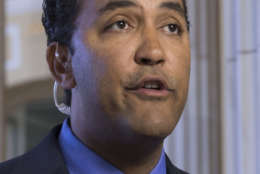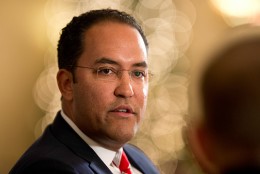Digital Government
-
Chris Cairns and Robert L. Read make the case for agencies to once again try to use share-in-savings contracts to modernize technology systems.
May 10, 2017 -
In part one of Federal News Radio's special report on the DATA Act, Treasury Department and Office of Management and Budget officials say the three-year implementation is going well, while agency managers breathe a sigh of relief even as they prepare for the next step in standardized federal spending reports.
May 10, 2017 -
Acting Defense Department Chief Information Officer John Zangardi said he is taking a "risk-aware" approach when it comes to meeting his priorities, some of which include improving effectiveness and efficiency, learning to "speak warfighter," and defining cyber responsibilities.
May 05, 2017 -
The Homeland Security Department's Science and Technology directorate is publishing the latest deep dive into mobile device security and how to make sure federal agencies can use these essentially consumer devices safely. Vincent Sritapan, mobile security program director in the directorate, shares the details on Federal Drive with Tom Temin.
May 04, 2017 -
As the 2020 census approaches, lawmakers and the Government Accountability Office are concerned about the Census Bureau's cost estimation practices, lack of transparency and cybersecurity. No one currently has a clear picture of what the 2020 census will cost, although best estimates put it around $12.5 billion.
May 04, 2017 -
Passport Services also plans on rolling out push notifications for application renewals, as part of its efforts to reduce the burden on customer service phone lines.
May 03, 2017 How can federal IT professionals innovate in a constantly changing environment with a shrinking budget? Find out this week, when Larry Katzman, vice president of Business Development at Applied Information Services, joins host John Gilroy on Federal Tech Talk. May 2, 2017
May 01, 2017-
President Donald Trump signed an executive order establishing the American Technology Council to transform and modernize the federal government’s information technology and how it uses and delivers digital services.
May 01, 2017 -
Rep. Will Hurd (R-Texas) is taking a second bite at the IT modernization apple. The Texas Republican introduced an updated version of the Modernizing Government Technology or MGT Act. Hurd tells Executive Editor Jason Miller on Federal Drive with Tom Temin why he’s more confident in this version of the bill that is expected to help agencies move off of old, insecure technology.
May 01, 2017 -
OMB is revamping the capital planning and investment control (CPIC) process and asking agencies break down commodity IT spending in more specific terms than ever before.
May 01, 2017 -
The General Services Administration’s $50 billion Enterprise Infrastructure Solutions (EIS) telecommunications contract is back under a pre-award protest while DHS’s agile contract known as FLASH faces 12 complaints.
May 01, 2017 -
The Modernizing Government Technology Act will let agencies keep savings for up to three years to reinvest in IT transformation projects.
April 28, 2017 -
Angel Santa, the National Transportation Safety Board’s chief information officer, said creating a more dependable and faster infrastructure is a key piece to his modernization effort.
April 28, 2017 -
Open government advocates, industry, and agency officials are eagerly looking toward the May 9 implementation date for standardized federal spending information.
April 27, 2017 -
In this week's edition of On DoD, Peter Kim, the Air Force's chief technology officer, Alex Rice, the CTO at HackerOne, and Reina Staley, the chief of staff of the Defense Digital Service join is to talk about the latest of DoD's bug bounties: Hack the Air Force. We’ll also talk about changes in how the Army buys cloud computing services as part of a broader effort to shut down expensive, government-owned data centers.
April 26, 2017














